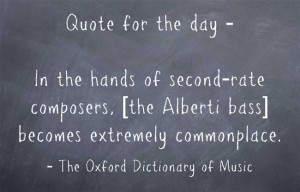What is Your #1 Harp Progress Blindspot?
If you can't see it, you can't fix it.
Etude a Day Challenge Wrap-up

© jro-grafik – Fotolia.com
Last month I launched my first “Etude a Day Challenge.” The participants were challenged to play through one etude a day from a book of etudes I selected for the 25 day course. My goal in presenting the challenge was to give harpists the experience of playing through something new each day and working for quantity and breadth of e...
The Third Stage of Memorization
 Memorizing music is a long process. Once most people have passed the first two stages, they think they are done. But that really is only the beginning.
Memorizing music is a long process. Once most people have passed the first two stages, they think they are done. But that really is only the beginning.
In previous posts, I wrote about the first two stages of memorization: rote memorization and conscious memorization. Rote memorization relies on repetition to develop knowledge strengthened by physical habit. Conscious memorization requires commit...
Weird Music Teacher Tips

© vlorzor – Fotolia.com
No, not tips for weird music teachers. Just some offbeat ideas to help with those difficult music lessons.
Your student didn’t practice this week? Did they forget to bring their music to their lesson? Maybe they need some help, motivation or inspiration? Or maybe they just feel stuck?
Sometimes teachers feel stuck too. But I have learned a few tr...
Are You a Good Listener?
 Here’s a thought for the day: Music is about listening. Ok, so it’s not earth-shattering news, but sometimes we get so caught up in making music that we forget to listen. We practice, play and practice some more. But if we are not listening, we are not using our best resource for correction and inspiration.
Here’s a thought for the day: Music is about listening. Ok, so it’s not earth-shattering news, but sometimes we get so caught up in making music that we forget to listen. We practice, play and practice some more. But if we are not listening, we are not using our best resource for correction and inspiration.
So how do you listen while you ar...
Why Memorization is a Poor Substitute for Note Reading
Do you memorize instead of reading the notes?

© Elnur – Fotolia.com
If so, you’re not alone. Many people do this believing it is easier, at least for them, to learn the notes for a specific piece rather than learn to read them in general.
If you are one of these people, you are probably aware that you do it and that your teacher says you shouldn’t. But reading the notes ...
How is Your Alberti Bass?
 How is your Alberti bass?
How is your Alberti bass?
This familiar bass pattern is named after the Venetian composer and singer Domenico Alberti (c. 1710 – 14 October 1740). It bears his name due to its frequent appearance in his popular harpsichord sonatas. In the centuries since, it has become a stock accompaniment pattern. You can find it harp music from Dussek to Damase. And despite its ubiquitous presence, it can stil...
Three Lessons from 32 Metronomes
This metronome video came my way on Facebook recently. If you haven’t seen it, it is amazing and beautiful, not usually words I apply to metronomes. And as I watched the video a second time, I was struck by some powerful principles it illustrated, truths for all musicians and all non-musicians too.
Here is the link to whole page; it’s worth reading!
1. Flexibility allows for consensus. In the ...
The Three Necessary Stages: Stage Two: Conscious Memorization

© Yong Hian Lim – Fotolia.com
In a previous post I wrote about rote memorization, the repetitive process that can be summed up in the words “strong” and “long.” If you are “strong” in your repetition, meaning you repeat something correctly every time in practice, the chances that you will repeat it correctly on demand are also “strong.” And if you repeat it correctly over a “long” time,...
Top 10 Reasons Every Musician Should Practice Bach
 I would find it difficult to pick one composer to call my favorite. I love the way Mozart’s music glistens and the intensity of Tchaikovsky. I can get lost in the emotion of Ravel and revel in the clarity of John Field. But on most days, if I had to pick just one, I would pick Johann Sebastian Bach.
I would find it difficult to pick one composer to call my favorite. I love the way Mozart’s music glistens and the intensity of Tchaikovsky. I can get lost in the emotion of Ravel and revel in the clarity of John Field. But on most days, if I had to pick just one, I would pick Johann Sebastian Bach.
I never tire of listening to his music, to the mind-bending complexity of a fugue or the overwhelm...
Why Your Practice May Be Holding You Back
 Here’s a radical thought – don’t practice so well.But wait! Isn’t careful practice what I am supposed to do, so I can play well, with a solid technique and mostly all the right notes?
Here’s a radical thought – don’t practice so well.But wait! Isn’t careful practice what I am supposed to do, so I can play well, with a solid technique and mostly all the right notes?
The answer is of course, unless that’s the ONLY way you practice. Careful practice can be a trap. If our only focus is trying to play correctly, we will never learn to play much.
An example: My mother’s aunt, Aunt ...